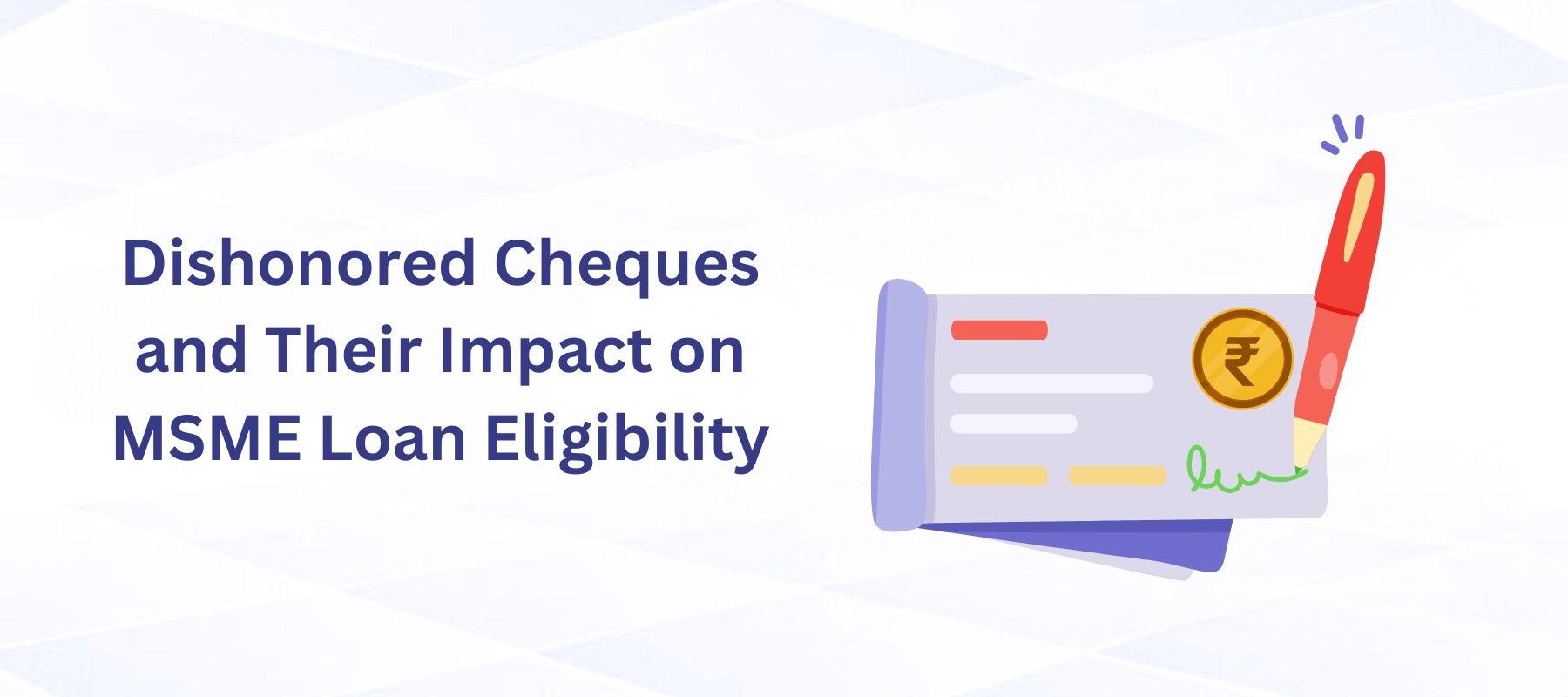Special Offers




Special Offers




11-Dec-2024 | Home Loan

A dishonoured cheque, commonly referred to as a bounced cheque, occurs when a bank refuses to process the payment due to issues such as insufficient funds, signature mismatches, or other discrepancies. For Micro, Small, and Medium Enterprises (MSMEs), cheque dishonours can have serious implications, particularly on loan eligibility. This article delves into the reasons for cheque dishonours, their consequences, and strategies to mitigate their impact, especially for MSME loan seekers.
A dishonoured cheque is one that a bank refuses to clear or pay. This can happen for a variety of reasons, often leaving the payee at a financial disadvantage. For businesses, including MSMEs, this can disrupt cash flow and tarnish financial credibility.
Key Characteristics of Dishonoured Cheques:
The bank stamps "dishonoured" or "bounced" on the cheque.
The payee must inform the payer about the issue.
Legal recourse may be pursued if the cheque was meant for debt repayment.
Several factors contribute to cheque dishonours, including:
The most common reason for cheque dishonours is the lack of sufficient balance in the payer’s account. This reflects poorly on the financial management of the payer and can lead to penalties.
If the signature on the cheque doesn’t match the one registered with the bank, the cheque will be rejected. This often happens when businesses update their authorized signatories but fail to notify the bank.
Post-dated or stale-dated cheques can result in dishonour. Banks typically do not accept cheques older than three months from the issuance date.
Cheques with overwriting, damage, or unclear details are often rejected as they raise concerns about authenticity and fraud.
Incorrect information, such as a mismatch in the name or account number, can also lead to dishonour.
For MSMEs, cheque dishonours can have severe repercussions, including:
Both the payer and the payee may incur penalty charges, which can add up and strain financial resources.
Dishonoured cheques issued for debt repayment may lead to legal action under Section 138 of the Negotiable Instruments Act, 1881.
Repeated cheque dishonours can erode trust between MSMEs and their vendors, suppliers, or clients.
Banks and financial institutions view dishonoured cheques as a red flag, which can lower the creditworthiness of an MSME.
Financial institutions consider cheque dishonour history when evaluating loan applications. A negative record can disqualify MSMEs from availing loans or lead to higher interest rates.
Dishonoured cheques indicate poor financial discipline, reducing a lender’s trust in the borrower.
MSMEs with a history of cheque dishonours are seen as high-risk borrowers, which could lead to loan rejections.
Lenders may ask for additional collateral or impose stricter conditions to mitigate risks.
If approved, loans for MSMEs with a cheque dishonour history may come with higher interest rates as a risk premium.
Ensure there is always a sufficient balance in your account to cover issued cheques.
Shift to digital modes of payment such as NEFT, RTGS, or UPI, which are faster and less error-prone.
Verify all details on the cheque, including the date, amount, and signature, before issuance.
Inform your bank promptly of any changes in authorized signatories or account details.
Handle cheques carefully and refrain from making manual corrections.
Ensure that the account has sufficient funds on the cheque clearance date to avoid dishonour.
If you receive a dishonoured cheque, you can take the following actions:
Inform the payer immediately and request them to rectify the issue.
The cheque can be presented again within three months of its issuance date if the payer assures sufficient funds.
If the cheque bounces again, file a case under Section 138 of the Negotiable Instruments Act. Ensure all required documents, such as the cheque, bank memo, and demand notice, are in order.
Tips for MSMEs to Maintain Financial Credibility
Automate Payments: Use online banking tools to schedule payments and avoid human errors.
Monitor Account Activity: Regularly check your bank statements to identify potential issues.
Keep a Cushion Balance: Always maintain a buffer amount in your account.
Educate Staff: Train employees handling cheques to avoid common errors.
Dishonoured cheques can severely impact the credibility and financial stability of MSMEs, especially when it comes to loan eligibility. By adopting better financial practices, such as maintaining adequate funds, using digital payment methods, and double-checking cheque details, businesses can avoid these pitfalls. For MSMEs, a proactive approach to financial discipline is essential to build trust with lenders and ensure long-term growth.
If a cheque bounces, the bank may impose penalties on both the payer and the payee. Repeated dishonours can lead to legal action against the payer.
Yes, cheque dishonours are viewed negatively by financial institutions and can impact your creditworthiness.
Maintain sufficient funds, verify all cheque details, and opt for digital payments wherever possible.
While it’s possible, repeated cheque dishonours can complicate the process, requiring additional collateral or higher interest rates.
Yes, under Section 138 of the Negotiable Instruments Act, cheque dishonours can lead to fines, imprisonment, or both.
A dishonoured cheque can be resubmitted within three months from the date mentioned on it.